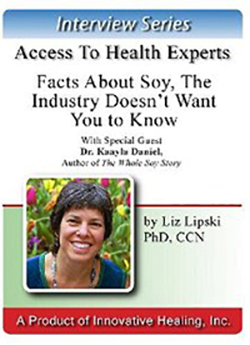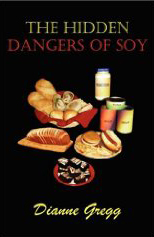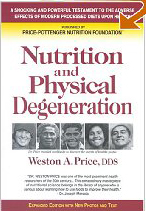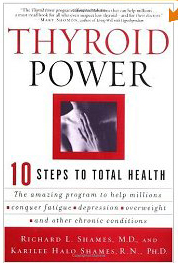Soy: The Dark Side of America's Favorite "Health" Food
For several decades, soy was promoted as the miracle food that will feed the world while
at the same time prevent and cure diseases. But Dianne Gregg, author of "The Hidden Dangers of Soy"
is sounding the alarm about soy in your diet, in your animal feed and about soy infant formulas.
According to authors Sally Fallon and Mary Enig, the soy industry knows soy is poisonous, and “lie(s)
to the public to sell more soy." They say that soy is “the next asbestos."
They predict that there will be huge lawsuits with “thousands and thousands of legal briefs.
Researchers at Cornell University Medical College said that
children who got soy formula were more likely to develop thyroid disease and that twice as many diabetic
children had received soy formula in infancy as compared to
non-diabetic children. In fact, in other countries such as
Switzerland, England, Australia and New Zealand, public health
officials recommend highly restricted medically monitored use of
soy for babies and for pregnant women.
 "While even in 1966 there was considerable research on the
harmful substances within soybeans, you'll be hard pressed to find
articles today that claim soy is anything short of a miracle-food.
As soy gains more and more popularity through industry advertising,
we are moved once again to raise our voice of concern. Soybeans in
fact contain a large number of dangerous substances."
"While even in 1966 there was considerable research on the
harmful substances within soybeans, you'll be hard pressed to find
articles today that claim soy is anything short of a miracle-food.
As soy gains more and more popularity through industry advertising,
we are moved once again to raise our voice of concern. Soybeans in
fact contain a large number of dangerous substances."
- One among them is phytic acid, also called phytates. This
organic acid is present in the bran or hulls of all seeds and
legumes, but none have the high level of phytates that soybeans do.
These acids block the bodyís uptake of essential minerals like
calcium, magnesium, iron and especially zinc. Adding to the
high-phytate problem, soybeans are very resistant to phytate
reducing techniques, such as long, slow cooking.
- Soybeans also contain potent enzyme inhibitors. These
inhibitors block uptake of trypsin and other enzymes that the body
needs for protein digestion. Normal cooking does not deactivate
these harmful "antinutrients," that can cause serious gastric
distress, reduced protein digestion and can lead to chronic
deficiencies in amino acid uptake.
- Beyond these, soybeans also contain hemagglutinin, a clot
promoting substance that causes red blood cells to clump together.
These clustered blood cells are unable to properly absorb oxygen
for distribution to the body's tissues, and cannot help in
maintaining good cardiac health. Hemagglutinin and trypsin
inhibitors are both "growth depressant" substances. Although the
act of fermenting soybeans does deactivate both trypsin inhibitors
and hemagglutinin, precipitation and cooking do not. Even though
these enzyme inhibitors are reduced in levels within precipitated
soy products like tofu, they are not altogether eliminated. Only
after a long period of fermentation (as in the creation of miso or
tempeh) are the phytate and "antinutrient" levels of soybeans
reduced, making their nourishment available to the human digestive
system. The high levels of harmful substances remaining in
precipitated soy products leave their nutritional value
questionable at best, and in the least, potentially harmful.
There was considerable research done in 1966 about the harmful
substance within the soybean. Soy contains several naturally
occurring compounds that are toxic to humans and animals. The soy
industry frequently refers to these toxins as anti-nutrients, which
implies that they somehow act to prevent the body from getting the
complete nutrition it needs from a food. The soy toxins (such as
phytic acid) can certainly act in this manner, but they also have
the ability to target specific organs, cells and enzyme pathways,
and their effects can be devastating. As with any toxin, there will
be a dose at which negative effects are not observed.
Scientists have known for years that the isoflavones in soy
products can depress thyroid function and
cause goiters in otherwise healthy children and adults. A combined
research team of Cornell University Medical College and Long Island
Community Hospital medical experts have found that children who develop
Type1 diabetes are twice as
likely to have been fed soy formulas as those fed all other
foods This confirms concerns based on animal studies raised
in the 1980's and 1990s by Health Canada researcher Dr Fraser Scott
and led to the American Academy of Pediatrics issuing their warning
to pediatricians against any use of soy based formulas.
Milk Soy Protein Intolerance is commonly acknowledged and diagnosed by both
pediatricians and family physicians. In the medical field the
occurrence is also known as eosinophilic gastroenteritis or protein
intolerance. MSPI is diagnosed through the history of an infant who
displays irritable, colic-like behavior, poor growth, and abnormal
stools, some of which visibly show blood. Confirmation of the
diagnosis is made by a biopsy of the intestinal tissue showing an
increased amount of eosinophilic cells, eroded intestinal villi,
and hemorrhagic tissue. An increase in the level of eosinophilic
cells may also correlate with an allergic response of the
intestinal tissues due to the introduction of an allergic compound.
Many physicians request that parents alter the infant's formula, or
the mother's diet (for breastfed infants) prior to having a
gastroenterologist perform an invasive biopsy, then if the symptoms
diminish, or even cease, the diagnosis of MSPI is assumed.
Both formula-fed and breast-fed infants can develop an
intolerance to cow's milk protein and also soy protein. For infants
fed with the formula, it is easy to change to a different formula,
but more specialized formulas are more expensive. For many families
the costs of these formulas are prohibitive. For an infant who is breastfed, the
mother's diet must be altered to avoid milk and soy proteins in
order continue breastfeeding. This approach is certainly a much
less costly solution to the dietary demands of an MSPI infant.

Newest Research On Why You Should Avoid Soy
by Sally Fallon and Mary G. Enig, PhD
>
 "...the soybean contains large quantities of natural toxins or
"anti-nutrients". First among them are potent enzyme inhibitors that
block the action of trypsin and other enzymes needed for protein
digestion. These inhibitors are large, tightly folded proteins that are not completely deactivated
during ordinary cooking. They can produce serious gastric distress, reduced protein digestion and chronic
deficiencies in amino acid uptake. In test animals, diets high in
trypsin inhibitors cause enlargement and pathological conditions of the
pancreas, including cancer. Soybeans also contain
haemagglutinin, a clot-promoting substance that causes red blood
cells to clump together. Trypsin inhibitors and haemagglutinin are
growth inhibitors. Approximately 25 per cent of bottle-fed children
in the US receive soy-based formula - a much higher percentage than
in other parts of the Western world. Fitzpatrick estimated that an
infant exclusively fed soy formula receives the estrogenic
equivalent (based on body weight) of at least five birth control
pills per day. Scientists have known for years that soy-based
formula can cause thyroid problems in babies."
"...the soybean contains large quantities of natural toxins or
"anti-nutrients". First among them are potent enzyme inhibitors that
block the action of trypsin and other enzymes needed for protein
digestion. These inhibitors are large, tightly folded proteins that are not completely deactivated
during ordinary cooking. They can produce serious gastric distress, reduced protein digestion and chronic
deficiencies in amino acid uptake. In test animals, diets high in
trypsin inhibitors cause enlargement and pathological conditions of the
pancreas, including cancer. Soybeans also contain
haemagglutinin, a clot-promoting substance that causes red blood
cells to clump together. Trypsin inhibitors and haemagglutinin are
growth inhibitors. Approximately 25 per cent of bottle-fed children
in the US receive soy-based formula - a much higher percentage than
in other parts of the Western world. Fitzpatrick estimated that an
infant exclusively fed soy formula receives the estrogenic
equivalent (based on body weight) of at least five birth control
pills per day. Scientists have known for years that soy-based
formula can cause thyroid problems in babies."
Early in 2007, the Weston A. Price Foundation began hearing from inmates who were
suffering from a myriad of serious health problems due to the large
amounts of soy in the diet. These prisoners had found us through
the Soy Alert! section of our website. Complaints include chronic
and painful constipation alternating with debilitating diarrhea,
vomiting after eating, sharp pains in the digestive tract,
especially after consuming soy, passing out, heart palpitations,
rashes, acne, insomnia, panic attacks, insomnia, depression and
symptoms of hypothyroidism, such as low body temperature (feeling
cold all the time), brain fog, fatigue, weight gain, frequent
infections and enlarged thyroid gland. Since soy contains
anti-fertility compounds, many young prisoners may be unable to
father children after their release.
Soy May Cause Cancer and Brain Damage
Two senior US government scientists have revealed that chemicals in soy could increase the risk of
breast cancer in women, brain damage in both men and women,
and abnormalities in infants.
"Dr Fitzpatrick's literature review uncovered evidence that soy
consumption has been linked to numerous disorders, including
infertility, increased cancer and infantile leukemia; and, in
studies dating back to the 1950s, that genistein in soy causes
endocrine disruption in animals."
The health claims of the soy industry have one purpose and one
purpose alone - to sell more soy! That's why you'll only hear
about the benefits of soy from the industry, but all consumers deserve the right to make an informed choice
about what they are eating and feeding to their children, their
household pets and their livestock.
Frequently consuming foods containing soy may contribute to memory loss, British experts say.
Experts at England's Loughborough and Oxford Universities
researched the impact of soy consumption in 719 senior citizens on
the Indonesian island of Java, the Daily Mail reported Saturday.
Researchers determined people who ate soy at least twice a day had
20 percent less memory function that those who ate it significantly
less. "Soy consumption is on the increase in the West and is often
promoted as a 'superfood.' Soy products are rich in micronutrients
called phytoestrogens, but it is not entirely clear what their
effect on the aging brain is," said Professor Eef Hogervorst of
Loughborough University. Hogervorst said vegetarians and elderly
women seemed to be highly susceptible to potential memory loss from
soy consumption.
John Robbins, author of Diet for a New America writes: "There are legitimate questions
about certain soy foods, and much we have yet to learn. Becoming soy-a-holics and
automatically downing anything made from soybeans is not the road
to health, but neither is shunning and stigmatizing soy foods. The
anti-soy crusade has needlessly frightened many away from a food
source that has long been a boon to humankind, a food source that
can, if we are respectful of our bodies and of nature, nourish and
bless us in countless ways."

Soy as a Male Contraceptive
Kaayla T. Daniel, PhD - "In September of this year,
researchers from the Harvard School of Public Health presented
evidence at the 63rd annual meeting of the American Society for
Reproductive Medicine showing that soy phytoestrogens can seriously
lower a man’s sperm count. This is old news to Weston A. Price
Foundation members. This research that links soy consumption to poor
 sperm quality, lower testosterone levels and sagging
libidos. Dr. Chavarro and colleagues studied 100 men whose partners
were having trouble getting pregnant. Semen analyses showed that
the men with the highest levels of soy food intake-approximately a
half serving per day-had 41 million sperm per milliliter fewer than
men who did not consume any soy-that’s 41 million fewer sperm per
milliliter on just one-half cup of soy food per day! The
researchers used a questionnaire listing 15 soy-based foods to
determine soy consumption over the preceding three months."
sperm quality, lower testosterone levels and sagging
libidos. Dr. Chavarro and colleagues studied 100 men whose partners
were having trouble getting pregnant. Semen analyses showed that
the men with the highest levels of soy food intake-approximately a
half serving per day-had 41 million sperm per milliliter fewer than
men who did not consume any soy-that’s 41 million fewer sperm per
milliliter on just one-half cup of soy food per day! The
researchers used a questionnaire listing 15 soy-based foods to
determine soy consumption over the preceding three months."
Soy also contains a natural estrogen, which is why it is
recommended to women at menopause. The president of the Maryland
Nutritionists Association, Mary Enig, Ph.D. stated that "The amount
of phytoestrogens that are in a days worth of soy infant formula
equals five birth control pills." Dr. Enig believes that
soy infant formula may be associated with early puberty in girls
and slower physical growth in boys. Others say it may effect
fertility and normal brain development.
The rise of Soy Allergies
In the 1980s, Stuart Berger, MD, labelled soy one of the seven top allergens—one of the "sinister seven"
Soy is one of the top allergens—substances that cause allergic reactions. In
the 1980s, Stuart Berger, MD, labelled soy one of the seven top
allergens—one of the "sinister seven". At the time, most experts
listed soy around tenth or eleventh—bad enough, but way behind
peanuts, tree nuts, milk, eggs, shellfish, fin fish and wheat.
Today, soy is widely accepted as one of the "big eight" that cause
immediate hypersensitivity reactions.
Allergies are abnormal inflammatory responses of the immune
system to dust, pollen, a food or some other substance. Those that
involve an antibody called immunoglobulin E (IgE) occur immediately
or within an hour. Reactions may include coughing, sneezing, runny
nose, hives, diarrhoea, facial swelling, shortness of breath, a
swollen tongue, difficulty swallowing, lowered blood pressure,
excessive perspiration, fainting, anaphylactic shock or even
death.
Delayed allergic responses to soy are less dramatic, but are
even more common. These are caused by antibodies known as
immunoglobulins A, G or M (IgA, IgG or IgM) and occur anywhere from
two hours to days after the food is eaten. These have been linked
to sleep disturbances, bed wetting, sinus and ear infections,
crankiness, joint pain, chronic fatigue, gastrointestinal woes and
other mysterious symptoms.
 Food
"intolerances", "sensitivities" and "idiosyncrasies" to soy are
commonly called "food allergies", but differ from true allergies in
that they are not caused by immune system reactions but by
little-understood or unknown metabolic mechanisms. Strictly
speaking, gas and bloating—common reactions to soy and other
beans—are not true allergic responses. However, they may serve as
warnings of the possibility of a larger clinical picture involving
allergen-related gastrointestinal damage.
Food
"intolerances", "sensitivities" and "idiosyncrasies" to soy are
commonly called "food allergies", but differ from true allergies in
that they are not caused by immune system reactions but by
little-understood or unknown metabolic mechanisms. Strictly
speaking, gas and bloating—common reactions to soy and other
beans—are not true allergic responses. However, they may serve as
warnings of the possibility of a larger clinical picture involving
allergen-related gastrointestinal damage.
PROFIT vs RISK
The soybean industry knows that some people experience severe
allergic reactions to its products. In a recent petition to the US
Food and Drug Administration (FDA), Protein Technologies
International (PTI) identified "allergenicity" as one of the "most
likely potential adverse effects associated with ingestion of large
amounts of soy products". Yet PTI somehow concluded that "the data
do not support that they would pose a substantial threat to the
health of the US population". This statement is hardly reassuring
to the many children and adults who suffer allergies to soy
products. And it ignores a substantial body of evidence published
during the 1990s showing that some of these people learn for the
first time about their soy allergies after experiencing an
unexpectedly severe or even life-threatening reaction. Severe
reactions to soy are rare compared to reactions to peanuts, tree
nuts, fish and shellfish, but Swedish researchers recently
concluded that "Soy has been underestimated as a cause of food
anaphylaxis" (Foucard T., Malmheden Yman, I., Allergy 1999,
53(3):261-265).11
Just How Much Soy Did Asians Eat?
In short, not that much, and contrary to what the industry may claim, soy has never been a
staple in Asia. A study of the history of soy use in Asia shows
that the poor used it during times of extreme food shortage, and
only when the soybeans were carefully prepared (e.g. by lengthy
fermentation) to destroy the soy toxins.
Soy is an important crop on American farms, and there is a
strong soy lobby. The health claims of the soy industry have one
purpose and one purpose alone - to sell more soy! But scientists
have known for years that the isoflavones in soy products can
depress thyroid function and cause goiters in otherwise healthy
children and adults. Researchers at Cornell University Medical
College said that children who got soy formula were more likely to
develop thyroid disease and that twice as many diabetic children
had received soy formula in infancy as compared to non-diabetic
children. In fact, in other countries such as Switzerland, England,
Australia and New Zealand, public health officials recommend highly
restricted medically monitored use of soy for babies and for
pregnant women.
Brain.com reports an ongoing study involving 3,734 elderly
Japanese-American men. That research has found that the men who ate
the most tofu during mid-life had up to 2.4 times the risk of later
developing Alzheimer's disease. Lead researcher Dr. Lon R. White
said that men who ate tofu at least twice weekly showed brain aging
about five years faster than those who seldom ate tofu. Soy has
also been implicated in interference with the absorption of
zinc, calcium, protein enzymes and amino acids.

Beware of Infant Soy Formulas
Precocious puberty in children have been fed soy formula. Early
maturation, such as breast development and menstruation as early as 6 years of age.
Dr. Mercola - "Soy formula is one of the worst foods that
you could feed your child. Not only does it have profoundly adverse
hormonal effects as discussed above, but it also has over 1000%
more aluminum than conventional milk based formulas. It is becoming increasingly common for
young children, even 5- and 6-year-olds, to go through
precocious puberty (aka early sexual development). The
introduction of this report even states that studies have found
girls as young as 2 years old entering puberty! This is clearly a
multi-faceted problem, but I believe one of its main causes stems
from your environmental exposure to a whole slew of
endocrine-disrupting chemicals. Even the conservative US
government has recognized that soy formula is a potent
endocrine disruptor. There is absolutely no reason to ever give
your child soy formula or soy milk. It is one of the worst foods
you could possibly give your child and the long-term health
complications can be quite significant.
Prostate cancer and breast cancer,
early puberty, endometriosis and infertility, irregular and painful
menstrual periods are only a few of the things your children will
have increased risk for if they are given soy formula or soy milk.
If you have already given your child these foods the best way to
reverse the damage is to have them rigidly follow
the eating plan. The nutrition from whole organic foods is the
most potent corrective force for these disruptions in hormones. If
you still aren't convinced of the dangers of soy you might want to
review the protest letter two FDA experts wrote earlier this year
which points to studies that show a link between soy and health
problems in certain animals."
Elaine Hollingsworth, director of the Hippocrates Health Center of
Australia and author of "Take Control of Your Health and Escape the Sickness Industry",
writes about the terrible effects of soy products on children:
"I am not exaggerating when I say that HUNDREDS of people have rung me during
the past year to tell me about dreadful health problems that
started after taking up the soy habit. Serious thyroid
malfunctioning is one of the most common complaints. This is
not surprising, since it has been known for years that isoflavones
in soy can depress thyroid function, causing autoimmune thyroid
disease and even cancer. It is a medically recognized fact that our
body absorbs significant amounts of what we put on our skin.
With Certified Organic food rapidly becoming the nutrition of choice by
the health conscious amongst us, why would you accept any less for
your skin? of the thyroid. By far the worst calls are from women
whose children have been fed soy formula. They tell me
heartbreaking stories about baby girls who show signs of early
maturation, such as underarm odour, breast development, body
hair and even menstruation as early as two, three and four years of
age! The risk appears to be greatest in girls who ingest soy
formula for nine months or more. In baby boys, 12 months of
soy feeding can lead to gross effects by the age of 11 or 12.
Breasts can appear and testicles do not develop. Several
women have rung asking what to do for these pathetic boys, who
refuse to participate in sports, fearing shower-room ridicule, and
who will be dependent upon thyroid drugs for life. I can't help,
and I don't think anyone can.
Nature did not intend infants to be fed hormones, and life-threatening consequences occur when
they are. Of course, these horrible problems do not occur with
every soy-fed baby, but is it worth taking such a chance?
Your child will not thank you, and you may never have
grandchildren. Drinking soy milk during pregnancy can cause a
failure to produce breast milk, which can
lead to feeding the baby soy formula. By far the worst cases
of soy damage are reported to us by women who have drunk soy milk
while pregnant, and then fed their babies soy formula. This
is a deadly combination. These women cannot restrain their
tears when describing the dreadful health problems their children
have. They keep repeating to me, "I didn't know, I just
didn't know, the doctor told me to drink it for my bones and give him soy formula."

Are Soybeans Making your Animal Sick?
The health risks associated with soy products far outweigh any potential benefit,
which is why pet owners should avoid exposing their
dog or cat to any food containing soy. In the mid-1980s,
29 cheetahs in American zoos died, many from liver disease. Only 18 were born, and 7 of those died before reaching adulthood.
Less than 10 percent of adult female cheetahs in captivity in North America produced live cubs but
in other countries, 60 to 70 percent was the norm. North American cheetahs were fed a commercial feline diet of horsemeat and soy.
Cheetahs living and breeding successfully in other parts of the world were fed whole animal carcasses.
Soy in parrot's diets
results in bone and beak disorders The harm that soy
causes animals has been known for decades, but this fact currently
appears to be ignored by manufacturers of animal feeds who are ever
eager to utilize cheap sources of protein in their products.
Do Soy Foods Negatively Affect Your Thyroid?
by Mary Shomon
It seems that there's isn't a newspaper, magazine or news
program that hasn't recently featured a story on the amazing health
benefits of soy food products and soy/isoflavone supplements. Soy
is promoted as a healthy alternative to estrogen replacement for
some women, as a possibly way to reduce the risk of breast cancer,
as a way to minimize menopause symptoms, and as a healthier,
low-fat protein alternative for meats and poultry.
But what all the positive stories fail to mention is that there is a very real --
but very overlooked -- downside to the heavy or long-term use of
soy products. Soy products increase the risk of thyroid disease.
And this danger is particularly great for infants on soy formula.
This is not information that the powerful and profitable U.S. soy
industry wants you to know. The sale of soy products is big
business, and the increasing demand for soy protein products, soy
powders and soy isoflavone supplements is making that an even more
profitable business than ever before.
 Dr. Richard Shames, a Harvard and University of Pennsylvania
graduate who served at the NIH, believes that we are witnessing an
autoimmune low-thyroid epidemic.
Doctors on the Thyroid Unit at Columbia Presbyterian Medical Center
in NYC have revealed that 20 million Americans are currently being treated for thyroid problems.
Synthroid, just one of the various thyroid medicines, is now either
first or second most-prescribed drug in the US. The University of
Colorado Health Sciences Center estimates that there are over 13
million more Americans who have undiagnosed thyroid problems that
are causing many of their uncomfortable symptoms (fatigue,
depression, excess weight, infertility, miscarriage, severe
menopause, dry skin, constipation, hair loss).
Dr. Richard Shames, a Harvard and University of Pennsylvania
graduate who served at the NIH, believes that we are witnessing an
autoimmune low-thyroid epidemic.
Doctors on the Thyroid Unit at Columbia Presbyterian Medical Center
in NYC have revealed that 20 million Americans are currently being treated for thyroid problems.
Synthroid, just one of the various thyroid medicines, is now either
first or second most-prescribed drug in the US. The University of
Colorado Health Sciences Center estimates that there are over 13
million more Americans who have undiagnosed thyroid problems that
are causing many of their uncomfortable symptoms (fatigue,
depression, excess weight, infertility, miscarriage, severe
menopause, dry skin, constipation, hair loss).
Kaayla T. Daniel, PhD - "Oprah Winfrey’s announcement last month on Good Morning
America that she “blew out” her thyroid brought much needed
attention to the underreported epidemic of thyroid disorders in this country.
Sadly, few commentators noted that Oprah’s consumption of soy milk and other
soy products might have played a key role in the development of her
thyroid problems. Oprah has told her viewers that she loves shakes
made with soy milk and blueberries. She has applauded when guests such as Julia
Roberts have talked about how much they “love” their soy milk. Unfortunately, soy
can seriously damage the thyroid gland, most often causing hypo-thyroidism,
with its symptoms of weight gain, leththargy,
fatigue and malaise. In Oprah’s case, soy may have initially over stimulated her
thyroid, causing a revved up metabolism and sleepless nights. With Hashimoto’s
thyroiditis-the likeliest diagnosis for Oprah-it is quite common for someone’s thyroid gland to go hyper
for a period before falling into the exhaustion of hypothyroidism.
The thyroid hormones regulate (1) metabolism, (2) growth and
development,(3) the activity of the nervous system. An under
production of these hormones is a hypothyroid condition, while an
overproduction creates a hyperthyroid condition.